Contributing £ 9
Thank you for being part of the change!
We would like to give you a huge hug, but we can only be grateful But hey, we can send you a big hug through a WhatsApp audio , what do you think?
> 05 Co-financiers
Goteo ha construido una historia única en el mundo del micromecenazgo. ¿Quieres seguir formando parte de ella?
There is someone behind
 Min.
Min.
 Opt.
Opt.

We would like to give you a huge hug, but we can only be grateful But hey, we can send you a big hug through a WhatsApp audio , what do you think?
We would like to give you a big hug , but we can only thank you. But hey, we can send you a big hug through WhatsApp audio, what do you think? We will also tell you about our adventure in Bangladesh , anecdotes and the progress of the project.
Your name in the credits of the official documentary . During the campaign, we will present the documentary at different events. Moreover, we want the social garment factory construction process to also be part of the documentary. We want to continue with the story that is related throughout the documentary and to show it as a possible solution. The virtual hug that is not missing and if it is physical, better, what better way to say thank you! In addition, we keep on telling you about our adventure in Bangladesh , anecdotes and the progress of the project.
Te enviaremos al lugar que nos indiques (solo Península y Baleares) una bolsa de tela hecha a partir de materiales reciclados del 4 colores disponibles de comercio justo hecha con algodón orgánico y en condiciones dignas, contiene dos historia reales de dos de las millones de víctimas que se encuentran en la industria de la moda; Todo empieza el 23 de abril de 2013, cuando una grieta... hasta aquí. Colores: Azul, Natural, Gris, Negro, Rosa
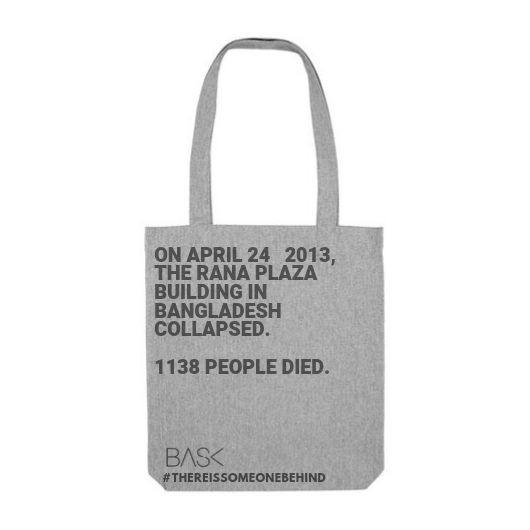
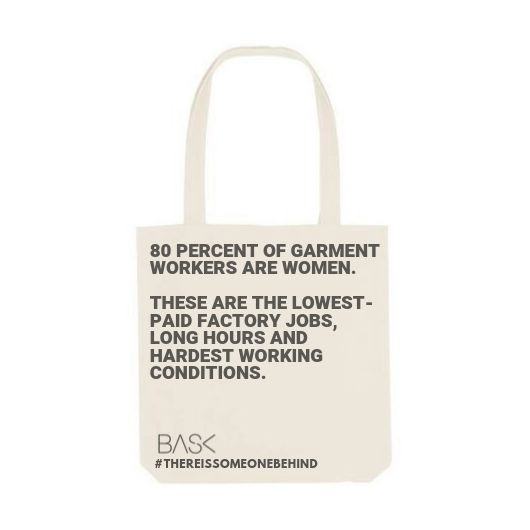
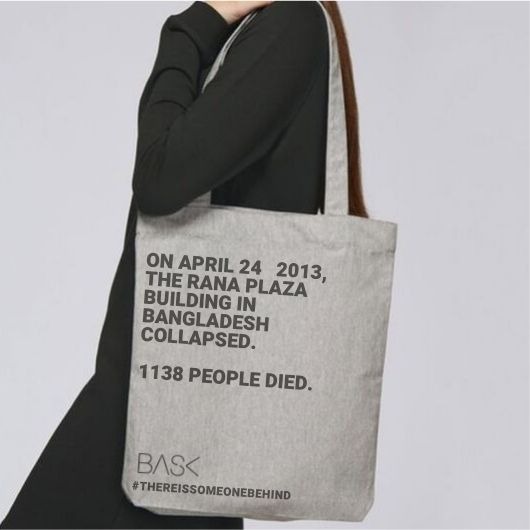
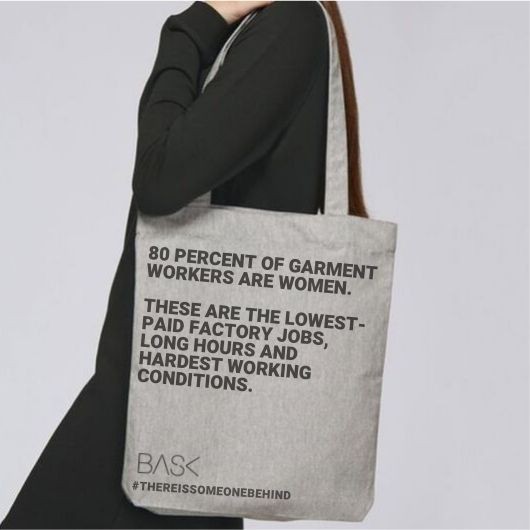
We will send to you to the place you indicate (only Peninsula and the Balearic Islands) a bag made from recycled materials of three available colours of fair trade made with organic cotton and in decent conditions with a true history of one of the million victims found in the fashion industry; It all starts on April 23, 2013, when a crack ... until here.
** Follow up
We will send to you to the place you indicate (only Peninsula and the Balearic Islands) a cloth bag made from recycled materials of the 4 available fair trade colours made with organic cotton and in decent conditions, it contains * two true stories of two of the million victims found in the fashion industry; It all starts on April 23, 2013, when a crack ... * until here.
**+ Follow up
A bag and cloth bag made from recycled materials of fair trade made with organic cotton and in decent conditions, they contain four true stories of four of the millions of victims found in the industry of Fashion;
** + Follow up
A fair trade activist camper made with organic cotton and in decent conditions. It will contain four true stories of four of the millions of victims in the fashion industry next to the bag and the bag made from recycled materials
**+ Follow up
Our goal is to develop an awareness campaign that will include events to present the documentary and raise public awareness of the environmental and social problems that this industry has in countries such as China, India and Bangladesh. Companies or sponsors who pay 500 euros will sponsor an event where the documentary will be presented along with other presentations from the same field.
This is a reward aimed at a brand that wants to bet on more responsible production and improve its corporate social responsibility by being part of the opening of a social garment factory in Bangladesh. It can be part of a project within the corporate social responsibility of a company that is aligned with the brand values.
After recording a documentary film in Asia about the impact of the fashion industry, we cannot keep our arms crossed.
 Material
Material
|
Minimum | Optimum |
|---|---|---|
|
Flights
We have to fly to Bangladesh and we also need a return ticket, or not, but in any case we put it.
|
£ 1,299 | |
|
subsistence allowance
Allowances to survive 4 months in Bangladesh, thankfully the food is cheap ... The cuisine of Bangladesh is very similar to the Indian one, although it also has influences from Chinese cuisine. The food is mainly based on rice and dhal (legumes without skin). A lot of fish is consumed, as it is a country with the sea, and chicken and lamb meat are usual too. The most common way to prepare the dishes is in curries, prepared with yogurt or coconut milk, and they are always very spicy. The food is accompanied by chapati bread. Again 4 months with diarrhoea...
|
£ 606 | |
|
Working Visa
We want to enter Bangladesh and we are not worth a tourist visa ...
|
£ 260 | |
|
Transport in Dhaka
We will use public transport, Uber or Tuk Tuk.
|
£ 606 | |
|
Commissions and rewards expenses
Not everything is benefit, to make the rewards we have an expense and the work of the drip platform also deserves its reward :)
|
£ 1,299 |
 Infrastructure
Infrastructure
|
Minimum | Optimum |
|---|---|---|
|
Rent a local for 4 months
We would need to open a space to be able to set up the garment factory. In the beginning, it will be rented or in collaboration with a brand that produces in the area.
|
£ 1,732 | |
|
Raw materials for the garment factory
Finally we would need the materials for the production of the penalties.
3 sewing machines
1 Over Machine
2 tables
4 desks
1 Iron
Needles of different thicknesses
pins
Brooches
Closures
Elastic
|
£ 2,599 | |
|
Stay for 4 months in Bangladesh, Dhaka
Let's see in what kind of hotel we sleep for 250€ per month... hopefully, there are not many rats ...
|
£ 866 | |
|
The more we get the more impact we will have.
It is a rather ambitious project but the minimum we need to be able to create a positive impact in Dhaka is 10,700, the more we get the more impact we will have, and the bigger things we can do.
|
£ 6,497 |
 Task
Task
|
Minimum | Optimum |
|---|---|---|
|
Legal procedures.
Hire a person to take this whole legal issue in Bangladesh.
|
£ 866 | |
|
We continue with the documentary
We will record some more shots about the impact that the fashion industry has, we were only 3 days in Bangladesh, we want to record the stories of the people behind our clothes #thereissomeonebehind
|
£ 1,126 | |
| Total | £ 9,268 | £ 17,757 |
Can you imagine a 15 year-old boy working days of more than 8 hours, 7 days a week in an insecure environment for a salary of less than $ 2 a day? This is a hard reality, but it is happening behind what we wear.
#thereissomeonebehind
We travel to the most affected places in Asia to record a documentary about the impact of the fashion industry on people and the planet. We understood that we not only wear a simple shirt, we wear all the environmental devastation and social injustices and inequalities that hide behind that garment. During this trip, we faced situations that we never thought we would.
It brought tears of sadness, of helplessness, of anger, of seeing the problem, but not the solution to our eyes. Sometimes, we overlook the great role we play in this system, we overlook that many small people in small places doing small things can change the world.
Back home, we understood that we wanted to be one of those small people who change the reality that is hidden behind what we wear, so we venture to create a new project, a social sewing garment factory in Dhaka, Bangladesh.
A social garment factory means a space where garments are made , a space where people are treated as people , do not suffer human rights violations, discrimination and where they have a decent salary in order to bring a full life and cover their basic needs eradicating the extreme poverty that these people suffer.
Approximately half of the world's population still lives with the equivalent of about 2 euros per day, and in many places, as in the case of Bangladesh, having a job does not guarantee the ability to escape poverty. We want to be part and accelerate this slow and uneven progress, and review our efforts and social commitment to eradicate poverty.
- Producers and garment workers in the textile industry may face excessive hours, forced overtime, lack of job security, denial of trade union rights, poor health, exhaustion, sexual harassment, discrimination and denial of other basic human rights in the job. Bangladesh is the second largest exporter of clothing. There are 40 million garment workers in textile factories in the world, and 4 million of these workers are in Bangladesh. Workers in Bangladesh earn about $ 2 a day, which makes them garment workers with the lowest wages in the world and more than 85% of workers in Bangladesh are women. They work many hours and often have to take their children to work. All dangerous chemicals in factories are affecting the health of these women and children. Workers have no voice in the wider supply chain and are forced to accept the conditions. In a large part of producing countries, young women face 150 hours of overtime per month, 60% do not have a contract and 90% of them do not have access to medical insurance. *
- Promote development-oriented policies that support productive activities, the creation of decent jobs, entrepreneurship, creativity and innovation.
- Take immediate and effective measures to eradicate forced labor, put an end to contemporary forms of slavery and human trafficking and ensure the prohibition and elimination of the worst forms of child labor, including recruitment.
Achieve full and productive employment and decent work for all women and men, including youth and people with disabilities and social exclusion, as well as equal pay for work of equal value.
Protect labor rights and promote a safe and risk-free work environment for all workers, including workers in social exclusion.
- Improve production in developing countries, particularly impacting the least developed communities.
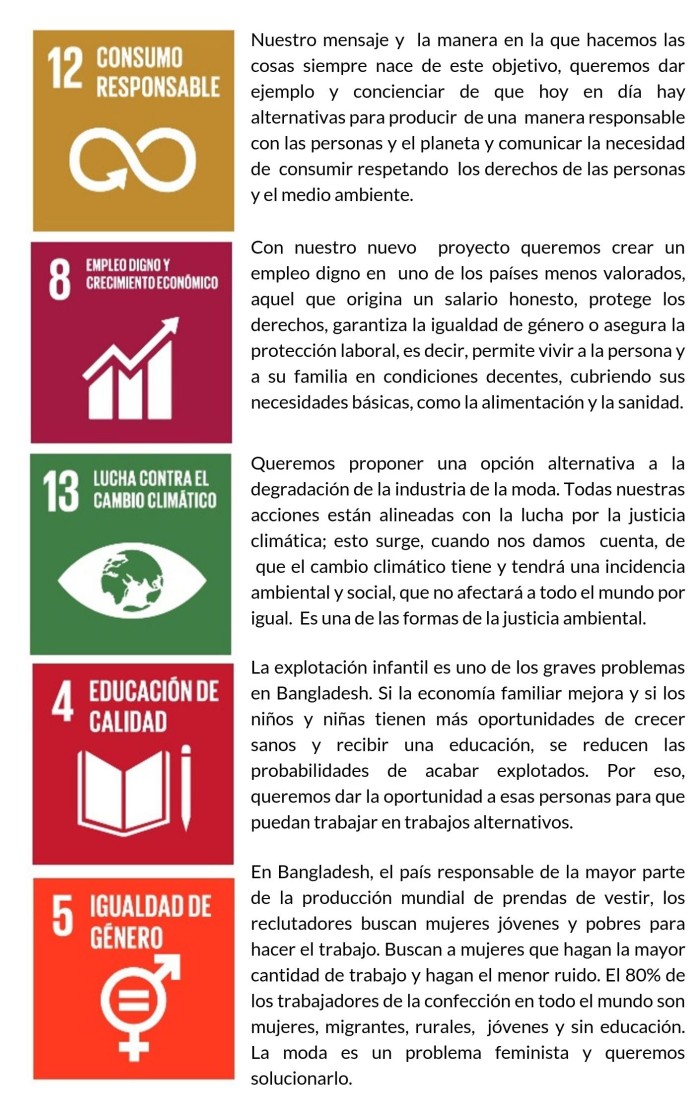
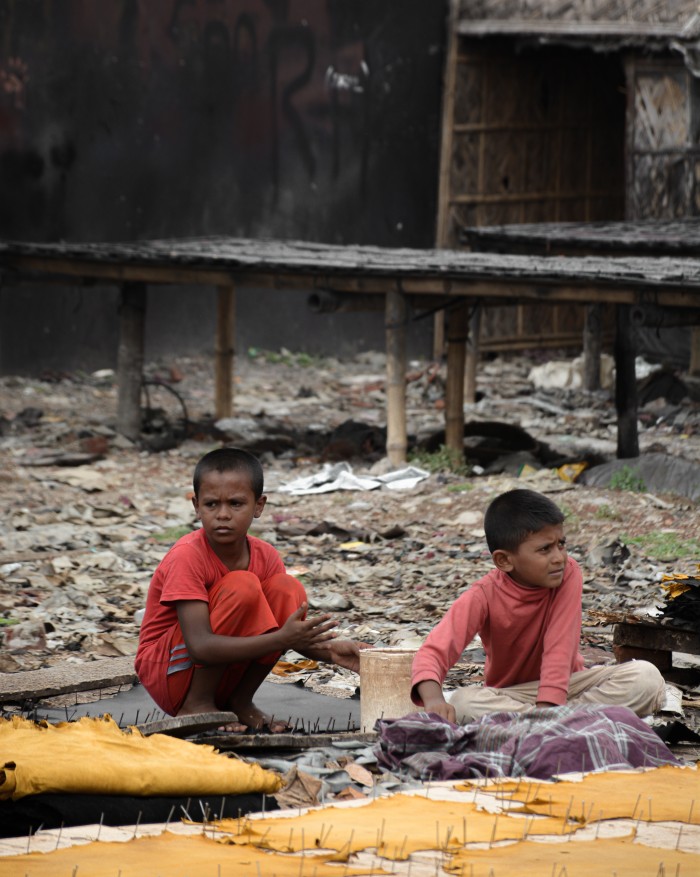
Fashion is the second most polluting industry in the world, responsible for 24% of insecticides and 11% of pesticides used worldwide, contributes to 8% of emissions and mass consumption of natural resources such as water, deforestation along with all the negative consequences that this is up to. It also encompasses many of the world's social injustices such as child abuse, violations of people's rights and accidents due to the lack of security in the space in which they work. These people suffer from extreme poverty in a devastated environment that causes irreparable damage and even death.
This begins 6 years ago, when news timidly invades the Western media. On April 23, 2013, the Rana Plaza manufacturing complex on the outskirts of Dhaka (Bangladesh) creaked under the feet of its thousands of busy occupants. Terrified, they were forced to return to the machines. The next day, the factory collapsed with them inside: the result was 1,134 bodies and more than 2,000 injured.
This was the reason why we undertook a trip to Asia, with the aim of recording a documentary that uncovered the hidden reality of the industry responsible for the greatest environmental devastation and social injustices, nothing more and nothing less than the second most polluting industry in the world the fashion industry.
What we saw on this trip we cannot explain it with words. For a moment we were complicit in a scene where we were holding a camera of more than 1000 euros, a computer and all the photographic equipment in the back, focusing on a 16-year-old boy who worked in horrible working conditions. He worked days of more than 8 hours and charging less than 2 euros a day. It was there when we realized that in Bask we were not giving a solution to this problem. The boy's name is Jewel and he had been working for more than 2 years. He had only received education from 6 to 9 years old and was not admitted to school because he was "older."
Throughout the trip, this was one of the stories that struck us the most. The tears of sadness, of impotence, of seeing the problem, but not the solution, jumped. But sometimes, we overlook the great role we play in this system, we overlook, that many small people in small places doing small things can change the world and we want to be one of those small people who can be part of the change of this reality that lies behind what we wear.
Until then we thought that the most ethical and sustainable way to produce our garments was based on a local confection. On this trip we realized that there are many people who do not have the opportunity to work in a dignified way and that not everything that is produced in India and Bangladesh has to do with the devastating consequences of the fashion industry. Our challenge is clear, to change the social reality found in these countries and to help communities transform using fashion as an engine.
AFTER LIVING THIS SITUATION WE CANNOT STAY WITH THE ARMS CROSSED.
This project is mainly aimed at those people in social exclusion who work in garment factories that neither security, nor conditions, nor wages are worthy to be able to live a full life out of extreme poverty that a large part of the people in Bangladesh suffer .
This project is also aimed at all the people who want to be part of a social transformation in the fashion world, to those people who want to have the opportunity to wear something more than a garment. Each garment made in this garment factory will be a decent life for the person behind our Proudly Made in Bangladesh label.
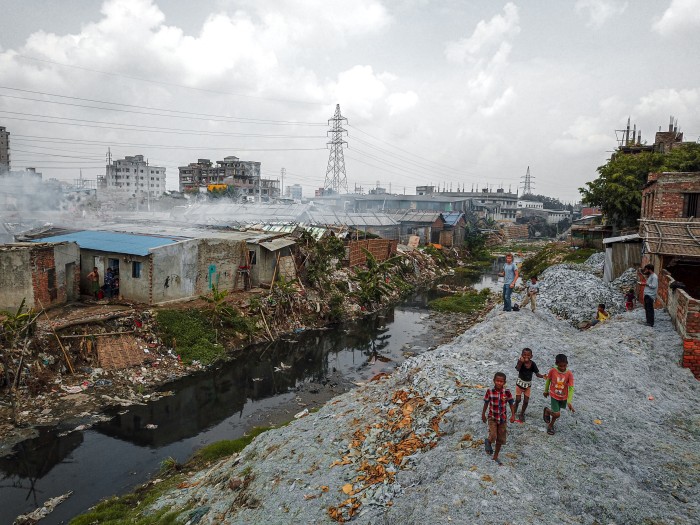
We are a clothing brand created by and for people and the planet. We think well beyond clothes. Our clothes and the people who make them are treated with respect and, in turn, respect the world around them.
At Bask, we do not believe that by minimizing environmental damage is sufficient, we feel the responsibility of fixing the damage already caused in our environment, that is why we undertake different projects to raise people's awareness of current reality and be part of the change through participatory events such as Garbage collection.
I am Apurva San Juan and I am part of the Bask team.
I was born in India, a country where most people work for hours, in dire conditions, to get a salary that does not reach the euro. I live in a world where we are taught to buy compulsively and get everything we want at the stroke of a card. Where fashion culture describes who we are and what it costs here we belong.
But nobody teaches us where everything we carry comes from, and of course its price is much higher than what we see on the label.
I am in Bask because I have the opportunity to change the future of people who were born in the same situation as me but who unfortunately were not so lucky.I am Maddi Bercianos and I am part of the Bask team.
When I started being interested about the fashion industry, I immediately knew that it was the second most polluting industry in the world. That was the moment when I knew I couldn't keep on consuming as I used to before while knowing that buying a cotton t-shirt means to consuming 2700 Litres of water for example.
I am in Bask because I want to change that reality that fashion is one of the causes of the climate emergency.I'm Jon Kareaga and I'm part of the Bask team.
I have had the opportunity to travel to the most remote places in Asia to record a documentary about the impact of the fashion industry on people and the planet.
I have witnessed situations I never thought I would see. I have seen what is hidden behind what we wear, of the environmental consequences and social injustices that are hidden behind this industry.
Back home I decided to do something to improve this situation, that is why we have just launched a crowdfunding campaign to open a social garment factory in Dhaka Bangladesh.
We will present the documentary in several places creating events to raise public awareness and raise awareness about the impact that our irresponsible consumption has in countries such as China, India and Bangladesh. The documentary has been funded by the Diputación de Gipuzkoa and we will use it as an awareness tool to get the money we need to open the social garment factory. We have key collaborators that will help us organize these events in different cities. Among them; Fridays For Future and Fashion Revolution.
We are a non-profit organization that puts people and the planet above economic benefits and currently all project members are working on a voluntary basis.
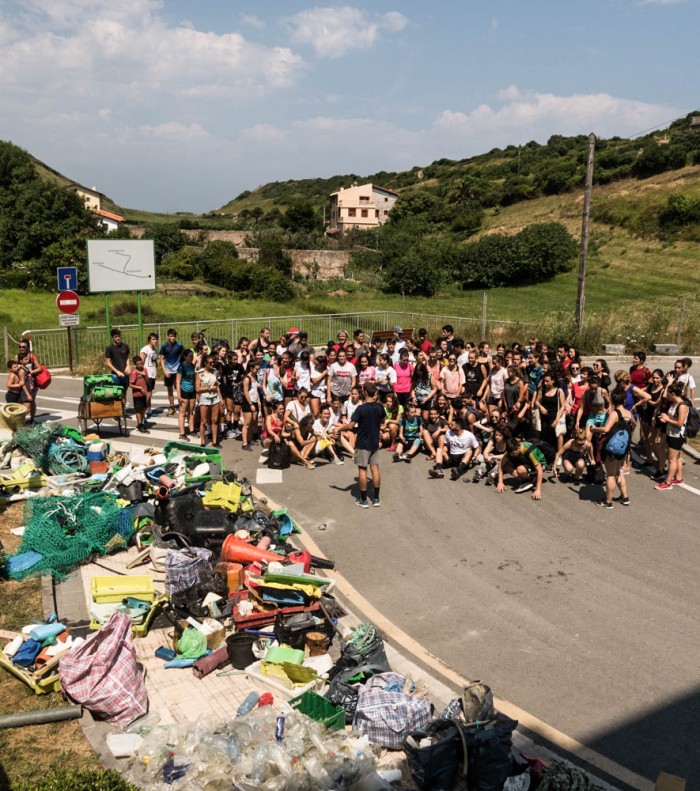
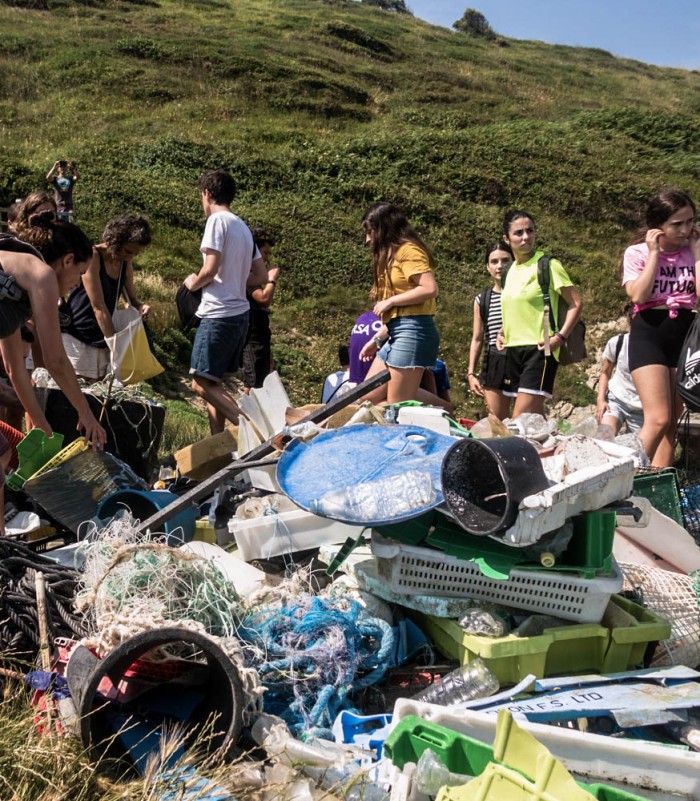
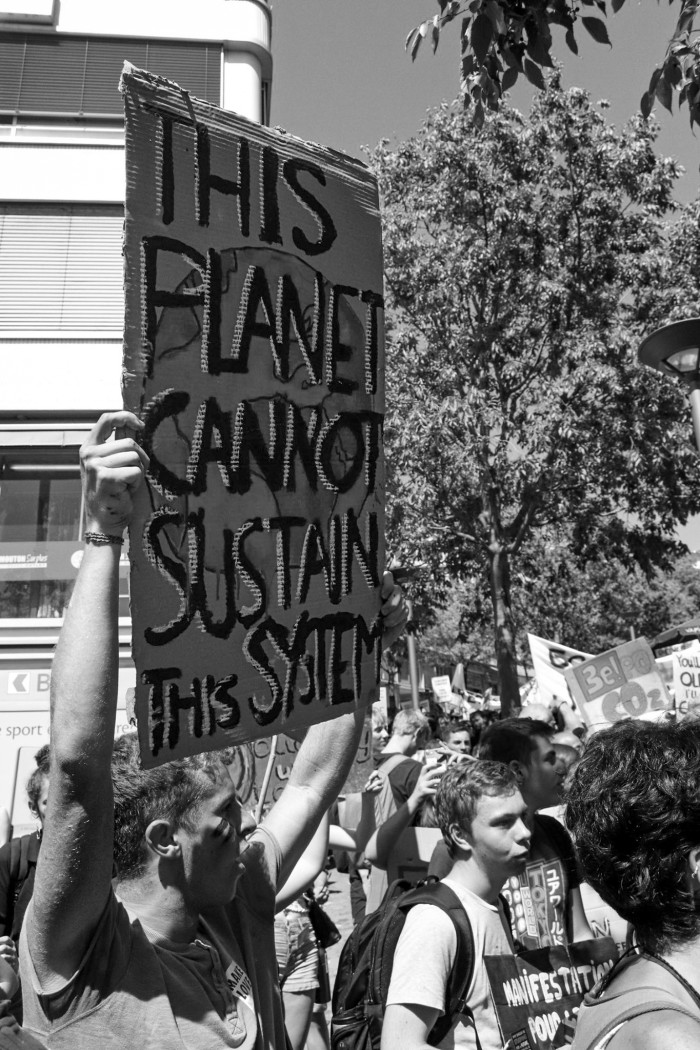

We want to solve the social and environmental consequences of the fashion industry in Bangladesh by providing an alternative way of producing garments at the service of people and the planet.
We are going to embark on a new adventure, opening a social sewing garment factory with different collaborators who are already an example and inspiration for how to do things ethically in Bangladesh. Throughout our trip, we had the good fortune to meet local people, from the sector and eager to continue empowering workers and changing things.
We have the support of key collaborators.
Thank you for being part of the change!
We would like to give you a huge hug, but we can only be grateful But hey, we can send you a big hug through a WhatsApp audio , what do you think?
> 05 Co-financiers
Follow-up + Gratefulness
We would like to give you a big hug , but we can only thank you. But hey, we can send you a big hug through WhatsApp audio, what do you think? We will also tell you about our adventure in Bangladesh , anecdotes and the progress of the project.
> 02 Co-financiers
Credits of the official documentary + Follow-up + Gratitude
Your name in the credits of the official documentary . During the campaign, we will present the documentary at different events. Moreover, we want the social garment factory construction process to also be part of the documentary. We want to continue with the story that is related throughout the documentary and to show it as a possible solution. The virtual hug that is not missing and if it is physical, better, what better way to say thank you! In addition, we keep on telling you about our adventure in Bangladesh , anecdotes and the progress of the project.
> 09 Co-financiers
SOLO HOY!! +Bolsa con historias
Te enviaremos al lugar que nos indiques (solo Península y Baleares) una bolsa de tela hecha a partir de materiales reciclados del 4 colores disponibles de comercio justo hecha con algodón orgánico y en condiciones dignas, contiene dos historia reales de dos de las millones de víctimas que se encuentran en la industria de la moda; Todo empieza el 23 de abril de 2013, cuando una grieta... hasta aquí. Colores: Azul, Natural, Gris, Negro, Rosa




> 38 Co-financiers
+ small bag with history
We will send to you to the place you indicate (only Peninsula and the Balearic Islands) a bag made from recycled materials of three available colours of fair trade made with organic cotton and in decent conditions with a true history of one of the million victims found in the fashion industry; It all starts on April 23, 2013, when a crack ... until here.
** Follow up
> 15 Co-financiers
+ bag with history
We will send to you to the place you indicate (only Peninsula and the Balearic Islands) a cloth bag made from recycled materials of the 4 available fair trade colours made with organic cotton and in decent conditions, it contains * two true stories of two of the million victims found in the fashion industry; It all starts on April 23, 2013, when a crack ... * until here.
**+ Follow up
> 15 Co-financiers
+ Small bag and Bag with history
A bag and cloth bag made from recycled materials of fair trade made with organic cotton and in decent conditions, they contain four true stories of four of the millions of victims found in the industry of Fashion;
** + Follow up
> 04 Co-financiers
+ T-shirt + Small bag + Bag
A fair trade activist camper made with organic cotton and in decent conditions. It will contain four true stories of four of the millions of victims in the fashion industry next to the bag and the bag made from recycled materials
**+ Follow up
> 14 Co-financiers
Sponsor in an event in the presentation of the documentary film
Our goal is to develop an awareness campaign that will include events to present the documentary and raise public awareness of the environmental and social problems that this industry has in countries such as China, India and Bangladesh. Companies or sponsors who pay 500 euros will sponsor an event where the documentary will be presented along with other presentations from the same field.
> 00 Co-financiers
Collaborator and key partner of the social garment factory.
This is a reward aimed at a brand that wants to bet on more responsible production and improve its corporate social responsibility by being part of the opening of a social garment factory in Bangladesh. It can be part of a project within the corporate social responsibility of a company that is aligned with the brand values.
> 00 Co-financiers
If you have something that you are not going to use (A sewing machine, sewing tools, Over machines ... every donation is welcome.